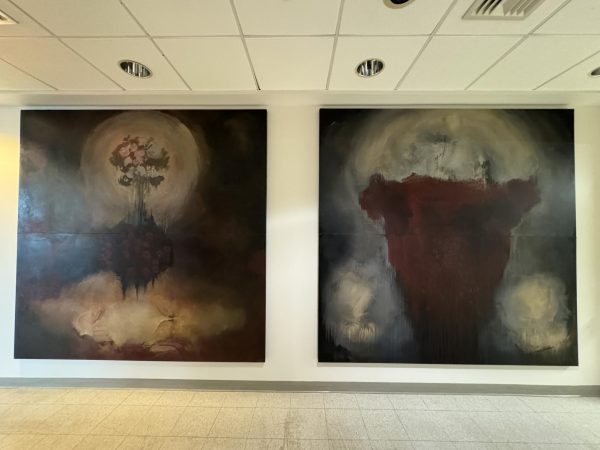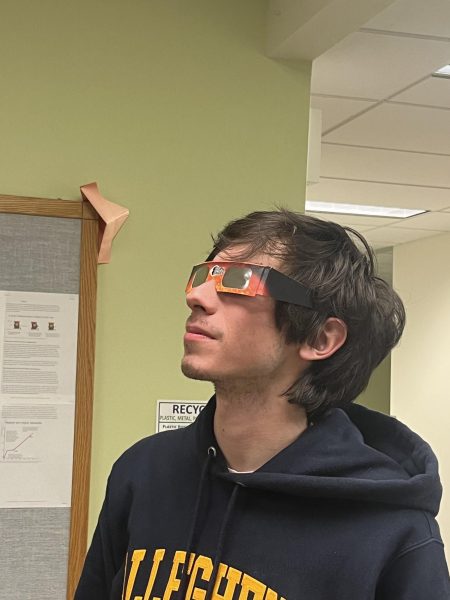‘Food forest’ to provide food and agricultural education
Allegheny College declared carbon neutrality in 2020, and became the first college in the state of Pennsylvania and eighth college in the nation to do so.
According to the European Parliament, carbon neutrality is defined as the balance between the emission and absorption of carbon from the atmosphere in carbon sinks, natural environments that are able to absorb the carbon dioxide that is emitted from the atmosphere.
On campus, three of the primary efforts to reduce carbon emissions were addressed in a plan for climate action that was adopted by the college’s Board of Trustees back in 2010.
One of these efforts was to reduce carbon emissions using efficiency retrofits, meaning that each of the building’s existing equipment would be removed and replaced with updated and more efficient equipment.
Another one of these efforts was to decarbonize energy sources on campus by shifting the source of energy from fossil fuels to alternative, more environmentally-friendly sources of energy.
The third effort mentioned in this plan was to reduce the remaining carbon emissions by investing in sustainable projects around campus.
One of these projects is the Carr Hall Garden.
Plenty of different fruits and vegetables are grown in this garden, and are supplied to the two dining halls on campus, Brooks Dining Hall and McKinley’s Food Court.
Members of the Sustainable Design Team, a small group of students from the Students for Environmental Action club are working together with professors to create a “food forest.”
Sebastian McRae, ’22, and Ashlynn Peachey, ’23, the founder of the Sustainable Design Team and current leader of the Sustainable Design team respectively, spoke about what they would like to accomplish with this food forest, as well as gave a bit more information about the appeal of the Sustainable Design Team.
McRae described the team as “just a collection of those students who wanted to do something slightly different.”
“The biggest appeal to me was that we were sitting down and we were planning on proposing something different that would actually make a difference on campus and really transform spaces around campus,” Peachey said.
One of the goals of this project is to help students learn more about permaculture, which was addressed by Kelly Boulton, ’02, director of sustainability at Allegheny College.
“It will model permaculture — how plants work in symbiosis,” Boulton said.
Permaculture is defined by Boulton as a system that designs sustainable human habitats by evaluating the different types of natural ecosystems around the world. According to Boulton, being able to understand these different ecosystems makes it much easier to mimic the benefits in ways that will benefit not only the environment, but people as well.
Boulton further explained that some of the benefits of using this system are growing plants that can be pollinated by certain insects and can be eaten by smaller animals, such as deer, squirrels, chipmunks, and even bears, diversify the plant life that we have around campus, and model how the members of this campus can be sustainable.
Additionally, Boulton spoke more about the different educational opportunities that will arise from this project.
In fact, Professor of Environmental Science and Sustainability Jesse Swann-Quinn is teaching a junior seminar this semester on the different ways to build up the functionality of the Carrden Food Forest, and Kerstin Ams, garden manager, is teaching her class about permaculture.
However, students in the class do not have hands-on experiences available to them on campus.
By implementing the Carrden Food Forest onto campus, these students will be able to learn more about agriculture, while also getting to experience it first-hand.
Although some of the more significant benefits from the food forest are community resilience, more visibility in the sustainability efforts around campus would be appealing to high school students who are considering going to Allegheny, and may even be of use to seniors who are planning on doing their senior research projects in environmental science.
“One could do a senior project looking at quantifying food production on campus,” McRae said.
While this food forest project is currently in the works, most of the benefits and full food yield will not be seen in the next few years.
“Unfortunately, it’s not going to be during our (graduating) class that we are really seeing this food forest in full production,” Peachey said. “I would say three or four years to start getting some yield, but then it’s just going to keep getting better and better and better as time goes on and it’s able to establish itself.”
McRae, Peachey and Boulton expect that this project will be extremely beneficial for Allegheny students once in full production.
Gabriella Brady is a junior from Pittsburgh, Pennsylvania. She is a Biology and Neuroscience double major and German minor. This is her second year on...






